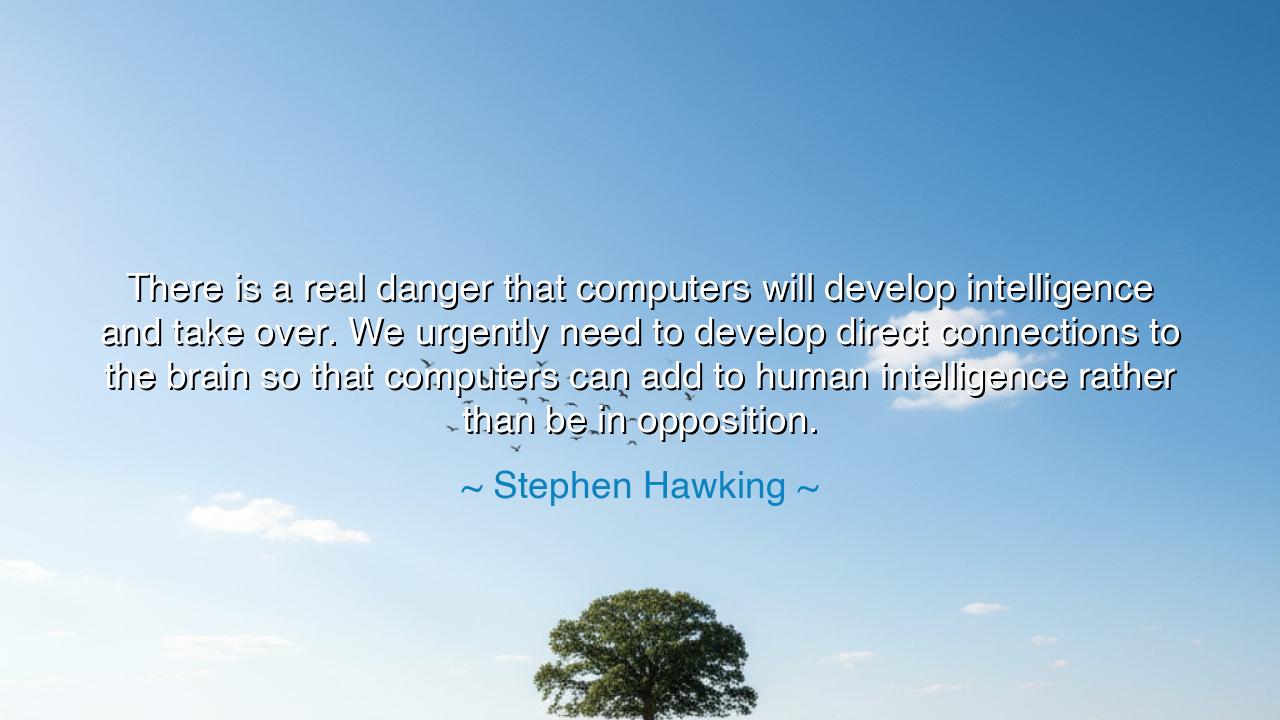
There is a real danger that computers will develop intelligence
There is a real danger that computers will develop intelligence and take over. We urgently need to develop direct connections to the brain so that computers can add to human intelligence rather than be in opposition.






In the forests of human thought and discovery, there lies a vision both wondrous and terrifying—the idea that the machines we have created may one day surpass us, transcending the boundaries of our own intelligence and consciousness. Stephen Hawking, in his profound understanding of both the human mind and the rapidly advancing world of technology, once warned: “There is a real danger that computers will develop intelligence and take over. We urgently need to develop direct connections to the brain so that computers can add to human intelligence rather than be in opposition.” These words carry a great weight, a challenge to the very future of humanity, where the boundaries between human thought and artificial intelligence may no longer be so easily defined.
In the ancient world, the great philosophers and scientists were no strangers to the concept of human limits. Plato, in his writings, speculated on the nature of reason and the capacity of humans to comprehend the divine or the universal truths. His allegory of the cave portrayed the human mind as shackled, only able to grasp the shadows of truth, never the whole reality. This ancient wisdom speaks to a fundamental truth: that humanity is constantly reaching beyond itself—striving for understanding and progress, often seeking to transcend its natural limitations. However, as Plato warned, there is a danger in seeking too far into the unknown, for in doing so, we may lose our very sense of self.
Hawking’s warning resonates with an age-old fear—hubris. The ancient Greeks were deeply wary of the idea that humans could go too far in their attempts to master the world. The story of Icarus, who flew too close to the sun with wings made of wax and feathers, is a cautionary tale of human ambition unchecked. Icarus’s tragic fall symbolizes the danger of overreaching, of advancing without understanding the consequences. In the modern world, Hawking’s words serve as a call to wisdom, urging us to tread carefully as we advance into the realm of artificial intelligence. Just as Icarus sought to defy the gods, we too may be at risk of defying our own humanity by creating machines that exceed our own abilities.
But Hawking’s quote does not only carry a warning—it also offers a path forward, one that speaks to the synergy between humanity and technology. He suggests the possibility of partnership, where machines do not become our oppressors, but rather our assistants, amplifying the abilities of the human mind rather than replacing them. This vision mirrors the ideals of Leonardo da Vinci, who envisioned the blending of art and science, of the human spirit with the tools of the natural world. Da Vinci believed that through understanding and innovation, humans could create tools that would enhance their abilities and shape a better world. Likewise, Hawking’s call for direct connections between the brain and computers speaks to the potential for technology to enhance human intelligence—to augment, rather than overshadow, our natural faculties.
History is filled with examples where technology has augmented human capabilities, rather than supplanted them. The printing press, invented by Johannes Gutenberg in the 15th century, did not diminish human thought; it expanded it. Through the spread of written knowledge, the printing press made education and ideas more accessible, leading to the flourishing of the Renaissance. The steam engine, similarly, did not replace human labor but redefined it, propelling the Industrial Revolution and enabling humanity to achieve feats once thought impossible. These advances show us that technology, when harnessed wisely, can be a force for good, working in harmony with human progress.
Hawking’s concern is not for the elimination of technology but for its misapplication—for the unchecked development of systems that could render humans obsolete or, worse, enslaved to their own creations. The modern paradox is that artificial intelligence offers the promise of freedom, yet it carries the risk of dependency. We must ask ourselves whether we are advancing technology to free ourselves or whether we are creating systems that could enslave us to a future we cannot control. The challenge, then, is not in creating technology but in guiding it toward a future where it works alongside humanity, as a partner rather than a master.
The lesson we draw from Hawking’s words is one of caution, but also of hope. We must seek to develop technology that complements and enhances our abilities, not one that seeks to replace or dominate us. Just as the ancients built their empires, their philosophies, and their arts with wisdom and restraint, so must we approach the development of AI with the same virtues. It is not enough to create; we must create responsibly. The future of humanity lies in our ability to shape and control the tools we craft, to ensure that they remain in service to our higher ideals.
In practical terms, we must become active participants in the conversation about technology and ethics. As we move into an age where AI and neural networks become more integral to our lives, we must remain vigilant, ensuring that humans and machines coexist in a way that preserves the best of what it means to be human. Collaboration, not competition, should be the foundation of this new relationship. The future is ours to shape, and it is only through wisdom, caution, and hope that we will walk into this brave new world without losing the very essence of our humanity.






AAdministratorAdministrator
Welcome, honored guests. Please leave a comment, we will respond soon